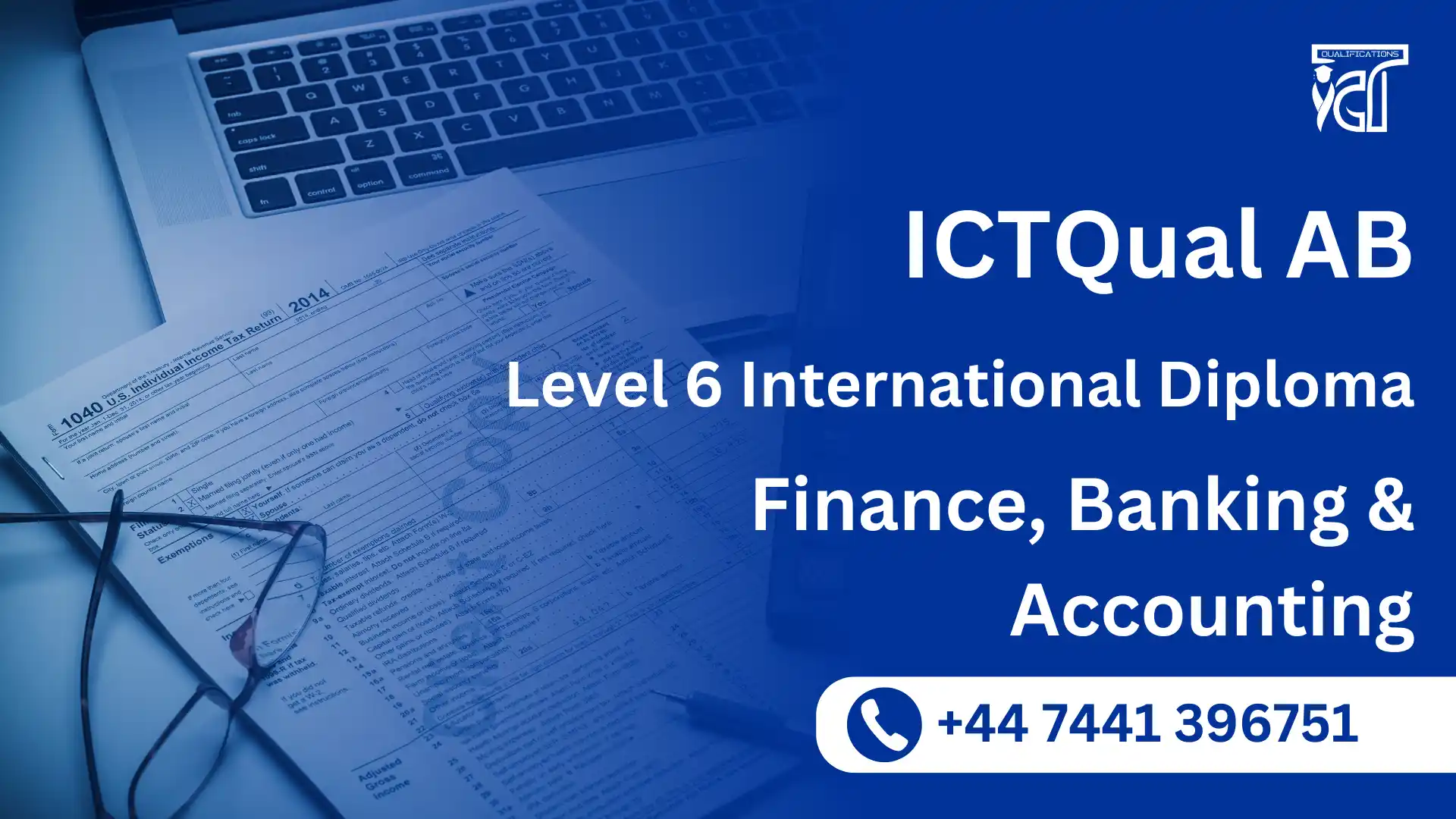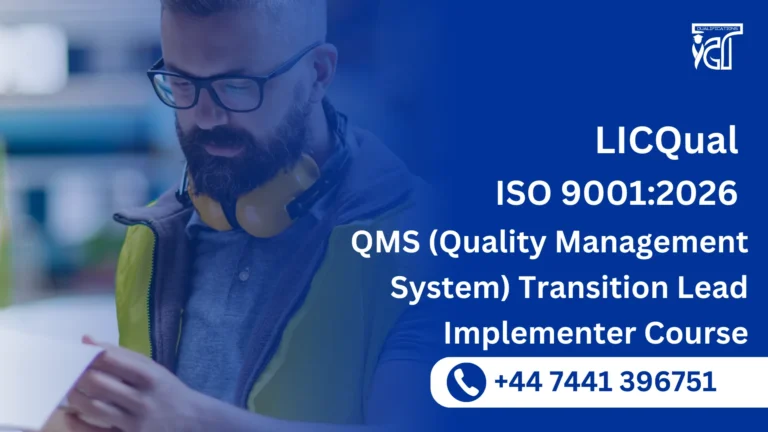The ICTQual AB Level 6 International Diploma in Finance, Banking & Accounting is a comprehensive programme designed to equip learners with advanced knowledge and practical skills in financial management, banking operations, accounting principles, and strategic financial decision-making. Spanning a three-year duration with a 360-credit structure, this diploma is ideal for both freshers seeking a strong foundation in finance and banking, as well as professionals aiming to enhance their career prospects, move into leadership roles, or specialise in accounting and financial management.
Learners will gain critical competencies in financial analysis, investment management, risk assessment, budgeting, auditing, and regulatory compliance. The programme emphasises both theoretical understanding and practical application, enabling learners to manage financial operations effectively, make informed strategic decisions, and contribute to organisational growth. By fostering analytical, problem-solving, and leadership skills, learners are prepared to meet the complex demands of the financial sector in a global business environment.
Upon completion, learners can explore a wide range of career opportunities in banking, corporate finance, auditing, investment management, consultancy, and multinational financial organisations. The diploma also provides a strong foundation for those pursuing higher education, specialisation in financial strategy, or professional certifications in finance and accounting.
Key benefits of the programme include a structured learning journey that develops practical and strategic financial skills, exposure to contemporary industry practices, and preparation for managerial, advisory, and operational roles. Learners gain professional credibility, hands-on expertise, and the confidence to make data-driven financial decisions that drive organisational success.
This programme is tailored for learners committed to excelling in finance, banking, and accounting, whether embarking on a new career or elevating existing professional experience, providing the knowledge, skills, and practical insight required to thrive in today’s competitive financial landscape.
ICTQual AB Level 6 International Diploma in Finance, Banking & Accounting
This qualification, the ICTQual AB Level 6 International Diploma in Finance, Banking & Accounting, consists of 36 mandatory units.
Year 1 – Foundation in Finance, Banking & Accounting
- Introduction to Financial Accounting
- Principles of Banking Operations
- Business and Organisational Fundamentals
- Fundamentals of Economics
- Communication Skills for Finance Professionals
- Principles of Management and Leadership
- Introduction to Financial Markets
- Business Mathematics and Statistics
- Ethics and Professional Conduct in Finance
- Introduction to Corporate Finance
- Research Methods in Finance and Accounting
- Fundamentals of Taxation
Year 2 – Intermediate Finance, Banking & Accounting
- Financial Reporting and Analysis
- Management Accounting and Budgeting
- Banking Law and Regulatory Compliance
- Investment and Portfolio Management
- Corporate Governance and Risk Management
- International Finance and Trade
- Advanced Business Mathematics and Modelling
- Human Resource Management in Financial Institutions
- Auditing Principles and Practices
- Strategic Financial Management
- Financial Information Systems
- Professional Development and Reflective Practice
Year 3 – Advanced Finance, Banking & Accounting
- Advanced Corporate Finance
- Strategic Banking Operations
- Financial Planning and Forecasting
- International Accounting Standards
- Risk Assessment and Financial Controls
- Derivatives, Securities, and Investment Analysis
- Leadership in Financial Organisations
- Financial Analytics and Decision-Making
- Tax Planning and Compliance
- Mergers, Acquisitions, and Corporate Restructuring
- Research and Evidence-Based Practice in Finance
- Capstone Project in Finance, Banking & Accounting
Learning Outcomes for the ICTQual AB Level 6 International Diploma in Finance, Banking & Accounting:
Year 1 – Foundation in Finance, Banking & Accounting
Introduction to Financial Accounting
- Learners will understand the principles and processes of financial accounting.
- Prepare and interpret basic financial statements accurately.
- Apply accounting standards to real-world scenarios.
- Recognise the role of accounting in organisational decision-making.
Principles of Banking Operations
- Develop knowledge of banking services and operations.
- Understand the roles of commercial and central banks.
- Learn transaction processing, deposits, and lending procedures.
- Apply practical banking procedures in everyday operations.
Business and Organisational Fundamentals
- Understand organisational structures and business functions.
- Analyse business operations and workflows.
- Recognise key factors affecting organisational performance.
- Apply fundamental management concepts in a business context.
Fundamentals of Economics
- Explain micro and macroeconomic principles.
- Analyse supply, demand, and market equilibrium.
- Understand economic indicators and their impact on finance.
- Apply economic reasoning to organisational decision-making.
Communication Skills for Finance Professionals
- Develop effective verbal and written communication.
- Apply business communication techniques in financial contexts.
- Prepare reports, emails, and presentations for stakeholders.
- Demonstrate interpersonal skills for professional environments.
Principles of Management and Leadership
- Understand key management and leadership theories.
- Develop planning, organising, and controlling skills.
- Apply leadership principles to motivate teams.
- Evaluate management practices in organisational settings.
Introduction to Financial Markets
- Understand global financial markets and instruments.
- Analyse market trends and economic indicators.
- Recognise the functions of capital markets, bonds, and equities.
- Apply knowledge to basic investment decision-making.
Business Mathematics and Statistics
- Apply mathematical techniques in financial calculations.
- Analyse data using statistical methods.
- Interpret financial and business metrics accurately.
- Solve practical problems using quantitative reasoning.
Ethics and Professional Conduct in Finance
- Understand ethical principles and professional standards.
- Apply ethical decision-making in finance and banking.
- Recognise conflicts of interest and compliance issues.
- Promote transparency and integrity in professional practice.
Introduction to Corporate Finance
- Understand financial management concepts and objectives.
- Analyse capital budgeting and investment decisions.
- Evaluate financial performance using ratios and metrics.
- Apply finance principles to business case scenarios.
Research Methods in Finance and Accounting
- Develop foundational research skills and methodologies.
- Collect, analyse, and interpret financial data.
- Prepare research reports and presentations.
- Apply evidence-based approaches to decision-making.
Fundamentals of Taxation
- Understand basic tax principles and regulations.
- Calculate tax liabilities for individuals and organisations.
- Analyse the impact of taxation on business decisions.
- Apply tax compliance procedures in practice.
Year 2 – Intermediate Finance, Banking & Accounting
Financial Reporting and Analysis
- Prepare and interpret intermediate-level financial statements.
- Analyse performance using financial ratios and metrics.
- Identify trends, anomalies, and financial risks.
- Make recommendations based on financial analysis.
Management Accounting and Budgeting
- Apply cost accounting and budgeting techniques.
- Prepare management reports for decision-making.
- Evaluate performance against budgets and forecasts.
- Support strategic planning with accounting insights.
Banking Law and Regulatory Compliance
- Understand banking legislation and regulatory frameworks.
- Apply compliance procedures in financial operations.
- Recognise the importance of anti-money laundering and ethics.
- Monitor organisational adherence to legal requirements.
Investment and Portfolio Management
- Analyse investment options and financial instruments.
- Construct and manage diversified portfolios.
- Evaluate risk and return profiles.
- Apply investment strategies to achieve financial goals.
Corporate Governance and Risk Management
- Understand governance structures and principles.
- Identify and assess financial and operational risks.
- Implement risk mitigation strategies.
- Promote ethical and transparent corporate practices.
International Finance and Trade
- Understand global financial systems and currency markets.
- Analyse the impact of trade and exchange rates on business.
- Apply principles of international finance in decision-making.
- Evaluate cross-border investment and financing options.
Advanced Business Mathematics and Modelling
- Apply advanced mathematical models to financial problems.
- Use quantitative tools for forecasting and decision-making.
- Interpret complex data for financial analysis.
- Develop problem-solving skills in practical finance scenarios.
Human Resource Management in Financial Institutions
- Understand HR practices in banking and finance sectors.
- Manage workforce planning, recruitment, and development.
- Apply performance management and motivation strategies.
- Promote organisational culture and employee engagement.
Auditing Principles and Practices
- Understand auditing standards and procedures.
- Conduct internal audits and compliance checks.
- Evaluate financial statements for accuracy and integrity.
- Apply auditing techniques to risk management.
Strategic Financial Management
- Develop strategies for financial growth and sustainability.
- Analyse capital structure, financing options, and investment decisions.
- Evaluate strategic financial plans for organisations.
- Implement long-term financial planning approaches.
Financial Information Systems
- Understand the role of technology in finance and accounting.
- Use financial software and information systems effectively.
- Analyse data for reporting and decision-making.
- Implement digital solutions to improve financial operations.
Professional Development and Reflective Practice
- Develop self-awareness and continuous professional growth.
- Apply reflective practice to enhance skills and performance.
- Engage in career planning and professional networking.
- Demonstrate leadership and ethical decision-making.
Year 3 – Advanced Finance, Banking & Accounting
Advanced Corporate Finance
- Analyse complex financial management scenarios.
- Evaluate mergers, acquisitions, and capital investment decisions.
- Apply corporate finance theories to strategic planning.
- Recommend solutions for financial optimisation.
Strategic Banking Operations
- Manage advanced banking operations and services.
- Analyse operational efficiency and customer service strategies.
- Evaluate risk management and compliance frameworks.
- Implement improvements in banking practices.
Financial Planning and Forecasting
- Prepare detailed financial plans and forecasts.
- Analyse budgets, cash flows, and investment projections.
- Apply forecasting techniques to support strategic decisions.
- Evaluate financial performance against targets.
International Accounting Standards
- Understand IFRS and other international accounting standards.
- Apply standards to financial reporting and consolidation.
- Ensure compliance in multinational contexts.
- Evaluate accounting treatments for complex transactions.
Risk Assessment and Financial Controls
- Identify financial risks and vulnerabilities.
- Implement internal controls to mitigate risks.
- Monitor compliance and operational performance.
- Evaluate the effectiveness of risk management strategies.
Derivatives, Securities, and Investment Analysis
- Analyse financial instruments, derivatives, and securities.
- Evaluate investment options and portfolio strategies.
- Understand hedging and risk management techniques.
- Apply analytical tools for investment decision-making.
Leadership in Financial Organisations
- Develop strategic leadership skills in finance contexts.
- Manage teams and projects effectively.
- Promote ethical decision-making and governance.
- Evaluate organisational performance and drive improvement.
Financial Analytics and Decision-Making
- Use advanced analytics for financial insights.
- Interpret large data sets for operational and strategic decisions.
- Apply data-driven approaches to optimise financial performance.
- Develop predictive models for financial planning.
Tax Planning and Compliance
- Plan tax strategies to minimise liabilities.
- Ensure compliance with national and international tax laws.
- Analyse tax implications for corporate and individual clients.
- Implement ethical and efficient tax practices.
Mergers, Acquisitions, and Corporate Restructuring
- Analyse corporate restructuring and transaction strategies.
- Evaluate financial, legal, and operational considerations.
- Apply due diligence processes effectively.
- Recommend strategic solutions for organisational growth.
Research and Evidence-Based Practice in Finance
- Conduct applied research in finance and accounting.
- Analyse findings to support strategic decisions.
- Apply evidence-based approaches in professional practice.
- Communicate research outcomes to stakeholders effectively.
Capstone Project in Finance, Banking & Accounting
- Integrate knowledge from all previous units into a major project.
- Analyse real-world financial scenarios and provide solutions.
- Demonstrate research, analytical, and practical skills.
- Present findings in a professional, industry-ready format.
The ICTQual AB Level 6 International Diploma in Finance, Banking & Accounting provides learners with comprehensive benefits that enhance both professional expertise and practical financial skills. By completing this programme, learners gain in-depth knowledge, analytical capabilities, and practical experience required to excel in finance, banking, and accounting roles. The course ensures learners are well-prepared for diverse career opportunities and leadership positions, equipping them with the confidence and competence to contribute strategically to organisational success.
1. Advanced Knowledge in Finance and Accounting
- In-depth understanding of financial management, banking operations, and accounting principles.
- Insights into budgeting, auditing, taxation, and financial reporting.
- Knowledge of investment management, corporate finance, and risk assessment.
- Exposure to regulatory compliance and financial legislation.
- Understanding of global financial markets and contemporary banking practices.
2. Professional Skill Development
- Enhanced analytical, critical thinking, and problem-solving skills.
- Competence in financial planning, forecasting, and decision-making.
- Development of leadership, communication, and team management skills in financial contexts.
- Ability to implement accounting standards, auditing procedures, and risk mitigation strategies.
- Practical skills for effective financial strategy and operational management.
3. Career Advancement Opportunities
- Eligibility for roles in banking, finance, auditing, investment, and corporate accounting.
- Opportunities in multinational financial organisations, consultancy firms, and corporate finance departments.
- Preparation for managerial, advisory, and executive positions.
- Pathway to specialisation in areas such as financial analysis, investment banking, or corporate finance strategy.
- Enhanced employability and professional credibility in competitive financial markets.
4. Global Perspective & Networking
- Understanding of international banking practices, financial markets, and investment strategies.
- Exposure to global financial regulations and compliance standards.
- Opportunities to network with finance professionals and industry experts worldwide.
- Development of cross-cultural awareness in financial operations and decision-making.
- Insight into international accounting standards and global financial reporting practices.
5. Practical & Transferable Skills
- Ability to analyse financial statements, conduct audits, and assess investment opportunities.
- Competence in financial modelling, reporting, and risk management.
- Adaptability to evolving financial technologies and digital banking solutions.
- Transferable skills applicable across various industries and sectors.
- Preparation for continuous professional development and lifelong learning in finance and accounting.
The ideal learner for the ICTQual AB Level 6 International Diploma in Finance, Banking & Accounting is someone passionate about finance, accounting, and banking, with a keen interest in understanding financial systems, investments, and strategic decision-making. This programme is suitable for freshers seeking a strong foundation in financial management, as well as professionals aiming to advance their careers, take on leadership roles, or specialise in finance, banking, or accounting. Learners should be analytical, detail-oriented, and motivated to develop practical, strategic, and problem-solving skills applicable in dynamic financial environments.
1. Aspiring Finance & Banking Professionals
- Individuals seeking to start a career in banking, finance, or accounting.
- Learners interested in investment management, corporate finance, and auditing.
- Those aiming to develop analytical, financial, and operational management skills.
- Individuals preparing for further studies or certifications in finance and accounting.
- Learners motivated to build a solid professional foundation in financial management.
2. Current Professionals & Managers
- Professionals looking to enhance financial, banking, or accounting knowledge.
- Those aiming to move into senior or managerial positions within finance departments.
- Learners seeking to improve strategic financial planning and decision-making skills.
- Individuals responsible for corporate finance, auditing, risk assessment, or investment management.
- Those striving for professional recognition and credibility in finance and banking sectors.
3. Fresh Graduates & Career Changers
- Recent graduates aiming to enter the finance, banking, or accounting profession.
- Individuals transitioning from other fields seeking financial expertise.
- Learners eager to gain practical, transferable skills for career readiness.
- Those looking for a structured, internationally recognised learning pathway.
- Individuals committed to building knowledge and confidence in financial management.
4. Global Finance Enthusiasts
- Learners interested in international banking, financial markets, and investment strategies.
- Professionals seeking knowledge of global financial regulations, compliance, and reporting standards.
- Individuals aiming to work in multinational financial organisations or advisory roles.
- Those keen on networking with finance experts and understanding international financial systems.
- Learners motivated to develop a globally relevant professional perspective in finance and accounting.
5. Lifelong Learners & Skill Developers
- Individuals committed to continuous professional and personal growth.
- Learners passionate about strategic financial planning, analysis, and decision-making.
- Those keen to enhance problem-solving, analytical, and leadership skills.
- Professionals aiming to adapt to evolving financial technologies and digital banking solutions.
- Learners seeking practical, transferable skills to thrive across industries and sectors.
Completing the ICTQual AB Level 6 International Diploma in Finance, Banking & Accounting equips learners with the knowledge, skills, and professional credibility to pursue advanced career opportunities, leadership roles, and specialised positions in finance, banking, and accounting. The programme ensures learners are prepared to manage financial operations effectively, make strategic decisions, and contribute to organisational growth.
1. Finance & Accounting Management Roles
- Eligibility for managerial and senior positions in finance, accounting, and corporate finance departments.
- Opportunities to lead budgeting, auditing, and financial reporting functions.
- Roles in financial planning, forecasting, and operational optimisation within organisations.
- Advancement to finance director, chief financial officer (CFO), or head of accounting roles.
- Preparation for strategic decision-making and leadership responsibilities.
2. Banking & Investment Careers
- Roles in commercial banking, investment banking, and retail banking operations.
- Opportunities in portfolio management, investment analysis, and wealth advisory.
- Engagement in risk management, regulatory compliance, and financial advisory services.
- Specialisation in corporate banking, international finance, or financial consulting.
- Preparation for senior advisory and management roles within banking institutions.
3. Auditing & Compliance Specialisation
- Careers in internal and external auditing, regulatory compliance, and assurance services.
- Roles in financial risk assessment, control implementation, and reporting compliance.
- Opportunities to contribute to corporate governance and financial integrity initiatives.
- Engagement with accounting standards, taxation laws, and financial regulations.
- Preparation for leadership positions in auditing and compliance departments.
4. Higher Education & Academic Progression
- Pathway to postgraduate studies such as Master’s or MBA in Finance, Accounting, or Banking.
- Specialisation in areas such as financial strategy, investment management, or risk analysis.
- Opportunities for research, teaching, and scholarly publications in finance and accounting.
- Access to international study programmes, scholarships, and fellowships.
- Strengthened credentials for professional and academic recognition.
5. Global & International Financial Opportunities
- Careers in multinational corporations managing global finance and accounting operations.
- Roles in international banking, trade finance, and cross-border investments.
- Engagement with global financial networks and compliance standards.
- Opportunities in consultancy for international clients and multinational organisations.
- Development of skills to manage diverse, geographically distributed financial operations.
As an approved centre of ICTQual AB, we offer learners two structured pathways to achieve the Level 6 International Diploma in Finance, Banking & Accounting.
Route 1: Experienced Professionals
- Eligibility: Learners must have at least six years of verifiable experience in finance, banking, accounting, or related sectors.
- Focus: Advanced modules covering financial management, investment analysis, banking operations, and strategic accounting.
- Benefits: Enhances leadership, analytical, and decision-making skills while building on existing professional expertise.
- Outcome: Prepares learners for senior finance, banking, and managerial roles.
- Learning Approach: Streamlined programme recognising prior experience and knowledge.
Route 2: Fresh Learners
- Eligibility: Designed for learners new to finance, banking, or accounting with limited professional experience.
- Focus: Structured learning through 36 assignments covering all key financial principles, accounting practices, and banking operations.
- Benefits: Builds foundational knowledge, practical skills, and confidence in finance and accounting.
- Outcome: Prepares learners for entry-level and junior roles in finance, accounting, or banking departments.
- Learning Approach: Step-by-step guidance ensures comprehensive skill and knowledge development.
Entry Requirements
To enrol in the ICTQual AB Level 6 International Diploma in Finance, Banking & Accounting, learners must meet the following entry requirements to ensure readiness for the programme’s academic and professional rigour:
Minimum Age
- Learners must be 18 years or older at the time of enrolment.
- Ensures maturity and readiness for advanced studies and professional engagement in finance, banking, and accounting.
Educational Background
- Completion of secondary education (high school) or an equivalent recognised qualification.
- Preferably, a Level 5 diploma or equivalent in finance, accounting, business management, or related disciplines for advanced preparation.
- Fresh learners without prior diplomas can enrol via the assignment-based pathway.
Experience
- Route 1 (Experienced Professionals): Minimum six years of verifiable experience in finance, banking, accounting, or related sectors.
- Route 2 (Fresh Learners): No prior experience required; learners complete 36 structured assignments to gain core competencies.
Language Proficiency
- Learners must demonstrate proficiency in English, as the programme is delivered entirely in English.
- Acceptable evidence includes:
- Prior education in English
- IELTS score of 5.5 or above, or equivalent
- Other recognised English language certifications
- Strong written and verbal communication skills are essential for completing assignments and engaging in financial and academic discussions.
Register Now
Qualification Process
Qualification Process for the ICTQual AB Level 6 International Diploma in Finance, Banking & Accounting
- Self-Assessment:
Begin by evaluating your eligibility to ensure you meet the qualification requirements, including work experience, knowledge, and language proficiency. - Registration:
Complete your registration by submitting the required documents, including a scanned copy of a valid ID, and paying the registration fee. - Induction:
An assessor will conduct an induction to confirm your eligibility for the course and explain the evidence requirements. If you do not meet the criteria, your registration will be cancelled, and the fee will be refunded. - Assignments & Evidence Submission:
Provide all assignments and the necessary evidence based on the assessment criteria outlined in the course. If you are unsure of the required evidence, consult with the assessor for guidance on the type and nature of evidence needed. - Feedback and Revision:
The assessor will review your submitted evidence and provide feedback. Evidence that meets the criteria will be marked as “Criteria Met,” while any gaps will be identified. You will be asked to revise and resubmit if needed. - Competence Evidence:
Submit final evidence demonstrating that all learning outcomes have been met. This evidence will be marked as “Criteria Met” by the assessor once it is satisfactory. - Internal Quality Assurance (IQA):
The Internal Quality Assurance Verifier (IQA) will review your evidence to ensure consistency, quality, and compliance with standards. - External Verification:
The IQA will submit your portfolio to ICTQUAL AB External Quality Assurance Verifiers (EQA) for final confirmation. The EQA may contact you directly to verify the authenticity of your evidence. - Certification:
Upon successful completion of all checks, ICTQUAL AB will issue your official certificate, confirming that you have attained the ICTQual AB Level 6 International Diploma in Finance, Banking & Accounting







